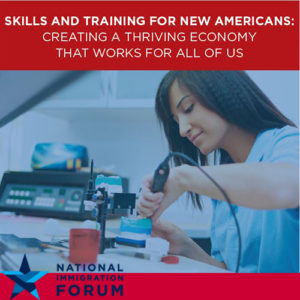By Kathy Tran
In 1980, my father was a 35-year-old Vietnamese boat refugee looking for work in the United States. We had just resettled in California, and my parents needed jobs to support their small family. My father thought it would be prudent to start his job search in the dental field, given his education, training, and experience.
My father had graduated from the University of Saigon’s School of Dental Medicine in 1971; he had served as a dentist in the South Vietnamese Army and volunteered at the dental clinic at the Pulau Bidong refugee camp, where we stayed for about one year. He applied for positions as a dental laboratory technician, an entry-level job that does not require even college training, let alone a dental degree. However, my father was rejected over and over again because he was overqualified and/or did not have enough English language skills — even though he was a willing, skilled and experienced candidate.
Like all Americans, my father and other immigrants and refugees want to advance in their careers and provide for their families. The National Immigration Forum’s newly published paper, Skills and Training for New Americans: Creating a Thriving Economy That Works for All of Us, provides an overview of key issues and recommendations to prepare adult immigrants, including those who are limited English proficient and are foreign-trained or have low educational attainment, to reach their full career potential.
The United States has an economic imperative to develop talent pipelines that meet the skills needs of employers. By 2020, less than four years from now, the country is expected to be short an estimated 7.5 million private-sector workers across all skill levels. Immigrants are and will remain a vital segment of the country’s workforce: Immigrants and their children will comprise all of the labor force growth in the next 40 years. Building the skills of immigrants is thus essential for maintaining U.S. economic growth over the coming decades.
Doing so requires bold leadership and increased investments from education and workforce development policymakers at all levels, philanthropic leaders, employers, community- and faith-based organizations and other stakeholders. In particular, immigrants need support building their English skills for career success, increasing their credential and degree attainment and improving their digital technology skills. Foreign-trained immigrants like my father need opportunities to maximize their potential.
My family will always be grateful to Mr. Sam, who hired my father to be a dental laboratory technician. While working with Mr. Sam, my father mentored other technicians, helping them hone their skills by sharing his experience as a dentist, and he gained valuable insight regarding the dental field in the United States. In 1986, my father opened up his own dental laboratory and became a successful American small business owner. After four years of working full-time six days a week and studying late at night, my father completed the requirements to become a licensed dentist in California and opened up his dental practice in 1994. My father’s return to his profession about 14 years after we resettled in the United States was one of the proudest moments for our family. Today, my parents are happily retired in San Diego.
The United States has an important opportunity to tap into and maximize the contributions of the immigrant workforce to ensure a thriving economy that works for Americans. We should seize this opportunity.

